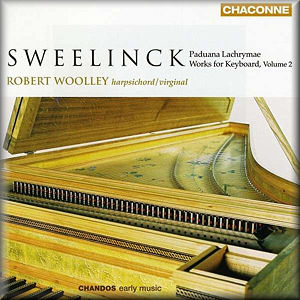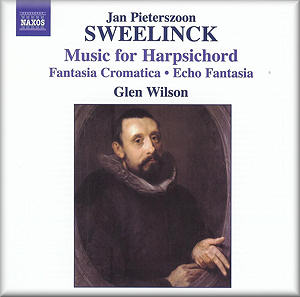 |
 |
| 

alternatively
CD: MDT
AmazonUK
AmazonUS
Sound
Samples & Downloads |
Jan Pieterszoon SWEELINCK
(1562-1621)
Keyboard Works - Volume 2
Toccata 9. toni (SwWV 297) [5:21]
Est-ce mars (SwWV 321) [4:33]
Paduana Lachrimae (SwWV 328) (after John Dowland)* [5:19]
Allemand (Gratie; More Palatino) (SwWV 318)* [3:52]
Toccata in C (SwWV 283) [3:28]
Die flichtig Nimphae (Vluchtige nymph) (SwWV 331) [2:08]
Toccata 1. toni in d minor (SwWV 286) [3:55]
Mein junges Leben hat ein End (SwWV 324) [6:24]
Pavan Philippi (SwWV 329) (after Peter Philips) [7:02]
Toccata 2. toni in g minor (SwWV 292)* [2:38]
Von der Fortuna werd ich getrieben (Engelse Fortuijn) (SwWV
320)* [3:12]
Unter der Linden grune (Onder een linde groen) (SwWV 325)*
[5:21]
Fantasia crommatica à 4 (SwWV 258) [8:01]
 Robert Woolley (harpsichord, virginal*)
Robert Woolley (harpsichord, virginal*)
rec. 20-21 October 2006, Glynde Church, East Sussex, UK. DDD
 CHANDOS CHAN0758 [63:37]
CHANDOS CHAN0758 [63:37]  |
| 

alternatively
CD: MDT
AmazonUK
AmazonUS
Sound
Samples & Downloads |
Jan Pieterszoon SWEELINCK
Music for Harpsichord
Praeludium (Fantasia) (SwWV 265) [3:47]
Est-ce Mars (SwWV 321) [5:05]
Fantasia crommatica à 4 (SwWV 258) [8:08]
Pavan Philippi (SwWV 329) (after Peter Philips) [9:10]
Mein junges Leben hat ein End (SwWV 324) [6:37]
Toccata 1. toni in d minor (SwWV 286) [4:11]
Allein Gott in der Höh sei Ehr (SwWV 299) [4:30]
Echo Fantasia in C (SwWV 253) [8:06]
Fortune my Foe (SwWV 320) [3:02]
Passomeza a 4 Voc. (Passamezzo moderno) (SwWV 326) [6:33]
Paduana Lachrimae (SwWV 328) (after John Dowland) [6:00]
Lucas OSIANDER (1534-1604)
Nun komm, der Heiden Heiland [0:39]
Anon (?Melchior
SCHILDT, 1592/93-1667)
Fantasia 1. toni à 4 [11:38]
 Glen Wilson (harpsichord)
Glen Wilson (harpsichord)
rec. 11-13 May 2008, Schuttbau, Rugheim (Unterfranken), Germany.
DDD
 NAXOS 8.570894 [77:28] NAXOS 8.570894 [77:28]  |
| |
Very few, if any, composers have so strongly influenced the
development of keyboard music in Europe as Girolamo Frescobaldi
and Jan Pieterszoon Sweelinck. Their music found wide dissemination
and they were much sought after as teachers. Through their pupils
they had a lasting influence on composing for the keyboard which
extended as far as Johann Sebastian Bach. Frescobaldi has been
given much wider attention than his Dutch contemporary. In 2002
the latter's complete oeuvre for keyboard was recorded for the
first time.
Sweelinck did not compose music only for keyboard. He published
four books with polyphonic settings of the Psalms on the melodies
of the Genevan psalter. A collection with Latin motets, called
Cantiones sacrae, was printed in 1619. Moreover he wrote
chansons, madrigals and canons. Last year (2010) the Gesualdo
Consort Amsterdam finished its project of recording all of Sweelinck's
vocal music, under the title 'The Sweelinck monument'.
But Sweelinck will always be first associated with the keyboard,
and that was already the case in his own time. In particular
in Germany his reputation as an organist was such that young
keyboard players went to Amsterdam to study with Sweelinck,
or were sent to him by their employers. Nicknames like 'Orpheus
of Amsterdam' and 'the German organist maker' bear witness to
the high esteem in which he was held.
At about the same time two discs were released with some of
Sweelinck's keyboard music played on harpsichord or virginals.
Both discs include pieces which could also be played at the
organ. In many cases the choice is up to the interpreters. Sweelinck
was organist of the Oude Kerk in Amsterdam, but he wasn't in
the service of the church. The organ was not used for Sunday
services. Under the authority of the city council Sweelinck
played during weekdays to entertain the inhabitants of Amsterdam.
Because of that there is little reason to assume he only played
sacred music at the organ. It is likely he would also have performed
variations on popular tunes of the time. He was particularly
famous for that, and improvised such variations at the harpsichord
during performances at home or in social gatherings of members
of the bourgeoisie.
The Chandos disc is the second Robert Woolley has devoted to
Sweelinck's keyboard music. On his first disc he played the
organ. I don't know whether a complete recording is planned,
but with these two discs one gets a very good impression of
the Sweelinck’s art. In this second volume Robert Woolley plays
two instruments. The first is a claviorganum: an organ with
a harpsichord on top of it. This instrument is a copy of a claviorganum
built by Lodewijk Theewes in 1579. It’s currently preserved
in the Victoria and Albert Museum in London. Woolley only plays
the harpsichord of this claviorganum. The second instrument
is a copy of a pair of virginals built by the famous Flemish
keyboard builder Ioannes Ruckers in 1611. This is a so-called
muselar, a typically Flemish form of virginals with the
keyboard placed off-centre to the right. Glen Wilson only uses
a harpsichord, which is a copy of another instrument by Ruckers.
The exact date of the original is not given but in his liner-notes
Wilson writes: "Since he [Sweelinck] died only about twenty
years before the type of double [double-manual harpsichord]
I use was invented, I hope I may be pardoned by purists".
One doesn't need to be a purist to have some objections to this
choice, and particularly the way he uses this instrument. The
sound is rather thick and heavy, and that makes some pieces
in his recording somewhat ponderous. That effect is exacerbated
by Wilson's sometimes rather slow tempi and his habit of playing
the notes of chords mostly simultaneously, whereas Robert Woolley
often plays them as an arpeggio. His playing is generally more
relaxed and he has the faster tempi. There is no such thing
as a 'right' or 'wrong' tempo in this music but on the whole
I prefer Woolley's choices as they sound more natural to my
ears and let the music flow.
Glen Wilson makes heavy weather of some pieces, in particular
the variations on Est-ce Mars, where he also creates
strong contrasts in tempo between the variations. Some are extremely
slow, others very fast. Woolley takes more of a middle ground
here, and that seems to me just right. The same goes for Mein
junges Leben hat ein End, and - to take a quite different
piece - the Pavan Philippi. In the Fantasia crommatica
Woolley and Wilson have chosen almost the same tempo, but the
former's performance is to be preferred. That shows that it
isn't just the tempo which is the issue, but also the way of
playing. Wilson often couples the manuals or the 8' and 4' registers,
and that makes the sound of the harpsichord even heavier. He
also regularly changes the registration during a piece which
seems questionable from a historical perspective.
I have much enjoyed the performances by Robert Woolley who plays
at a consistently high level and seems to have grasped the character
of Sweelinck's music quite well. The fiery performance of the
brilliant Toccata 9. toni which opens the programme sets
the tone. I prefer his harpsichord in this oeuvre, and the alternation
between the harpsichord and the very beautiful virginals only
enhances the attraction of this disc.
Although I am critical about some features of Glen Wilson's
recording I would like to point out that various pieces in his
programme come off quite well. The Paduana lachrimae
can stand the rather slow tempo. On his disc we find an example
of chorale variations which are mostly played at the organ,
Allein Gott in der Höh sei Ehr. Wilson convincingly demonstrates
that it fares well at the harpsichord. Not all pieces in his
programme are authentic. The Passomeza a 4 Voc. is generally
considered spurious. The programme ends with a piece which is
definitely not by Sweelinck. It has been preserved anonymously,
but is also attributed to Melchior Schildt, one of the many
German pupils of Sweelinck. The Fantasia 1. toni à 4
is based on the first line of the German hymn Nun komm, der
Heiden Heiland. It is a brilliant display of contrapuntal
ingenuity, and Wilson gives a commanding performance. It is
preceded by a harmonization of this hymn by Lucas Osiander.
The track-lists are quite different in the spelling of the titles
of various pieces. I have harmonized them, and used the spelling
of the Chandos disc as the standard. That one is also most up-to-date
in regard to the catalogue numbers. The SwWV refers to the new
catalogue of the Dutch Sweelinck scholar Pieter Dirksen. The
reference to this catalogue for the Naxos disc is incomplete,
and I have added the missing numbers.
It was a nice gesture by Glen Wilson to dedicate his disc to
his teacher Gustav Leonhardt and his wife Marie on the occasion
of their 80th birthdays. It is am embarrassment that Naxos wasn't
able to print the name of Mrs Leonhardt correctly.
Johan van Veen
http://www.musica-dei-donum.org
https://twitter.com/johanvanveen
|
|




 All Nimbus reviews
All Nimbus reviews








